GardenerHeaven.com is reader-supported. When you buy through links on our site, we may earn an affiliate commission.
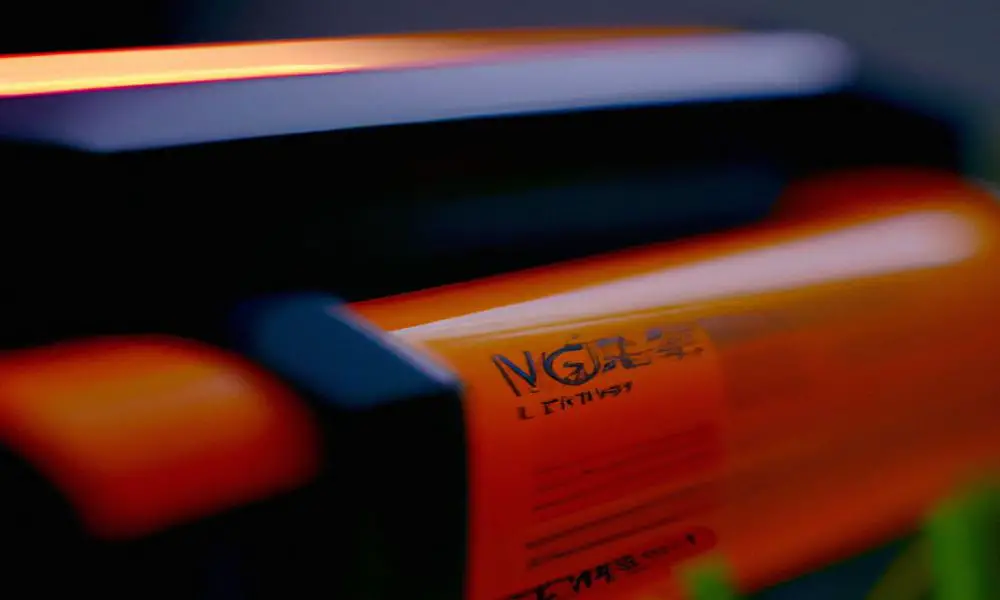
A lawn mower battery is a crucial component for the proper functioning of your mower. In this section, we will dive into the definition of a lawn mower battery and explore its significance in powering your equipment. Discover the essentials of understanding battery voltage and compatibility, ensuring that you have the right knowledge to select the appropriate battery for your lawn mower. So, let’s explore the world of lawn mower batteries and uncover their importance in maintaining a well-groomed lawn.
Definition of a lawn mower battery
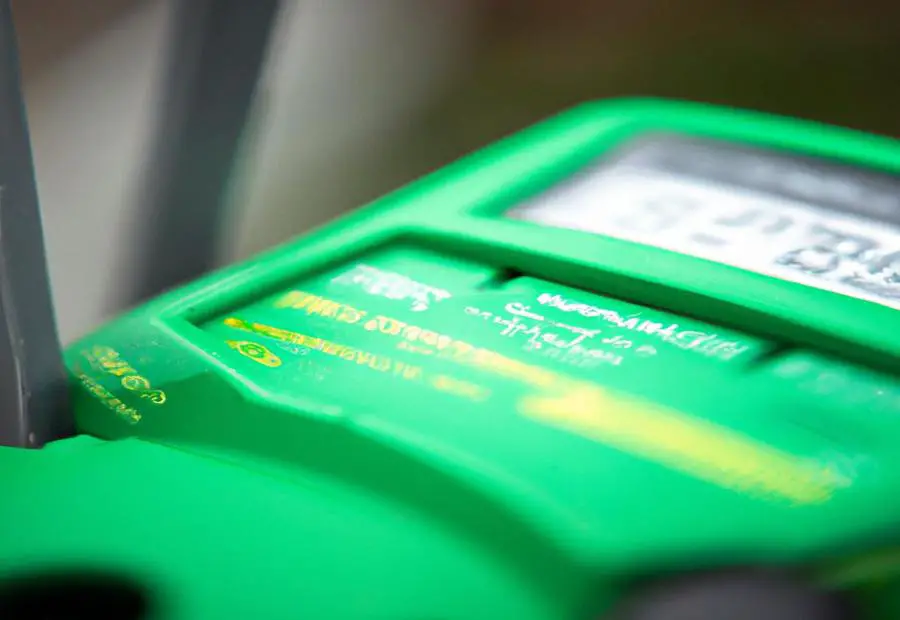
Photo Credits: Gardenerheaven.Com by Kenneth Lopez
A lawn mower battery is an essential component for ensuring the smooth operation of a lawn mower. It’s a power source that provides electricity for the engine and other functions.
Components include lead plates, sulfuric acid electrolytes, and a plastic casing. This creates voltage when connected to the mower’s electrical system.
Two common voltages are 6-volt and 12-volt. The 6-volt has a lower capacity, so it supplies less power over time. Which one you pick depends on the mower’s size, type, and power requirements.
When replacing the battery, take several specs into account. Type, size, voltage, capacity, and CCA rating. Check the manual or use a battery size chart to pick the right one. Maintenance can extend its life.
Without a lawn mower battery, your grass will go wild and your neighbors will be mad.
Importance of a lawn mower battery
A lawn mower battery is vital for its smooth functioning. It provides power to start the engine and other components. Without it, the mower won’t work effectively.
Plus, it powers headlights, safety switches, and electronic ignitions in modern mowers. A good one ensures reliable engine starts and enough power for all functions.
A backup battery is a must-have when external sources are unavailable, like during a power outage. It enables continuous mowing.
It also provides stable voltage output for protecting sensitive electronics from potential damage.
Proper inspection and maintenance prolong its lifespan and performance. Cleaning, checking for corrosion, and following manufacturer instructions for charging and storing are key steps.
In short, the importance of the battery can’t be underestimated. It’s essential for a mower’s functioning and performance. Regular upkeep is necessary to ensure its efficiency and longevity.
Understanding Lawn Mower Batteries

Photo Credits: Gardenerheaven.Com by Donald Jackson
Understanding Lawn Mower Batteries: From the components that make up these batteries to the chemical reactions that produce voltage, and even the difference between 6-volt and 12-volt options, this section will help you identify the voltage of your lawn mower battery with ease. No more confusion about battery compatibility or how many volts you need – we’ve got you covered.
Components of a lawn mower battery
A lawn mower battery consists of various components to provide power. These include the cells, terminals, electrolytes, and casing.
- Cells are the heart, converting energy into electricity.
- Terminals attach the battery to the mower.
- The electrolyte is a mix of acid and water that helps chemical reactions.
- The casing is for protection and safe handling.
These components join forces to create a powerful source for the mower. The cells have chemical reactions that create electricity. Then, the terminals connect the battery and the mower’s system. Lastly, the electrolyte helps these reactions by providing ions.
Some batteries have extra features like charge indicators or maintenance-free designs. These can make using them easier.
It’s important to know about batteries when looking for a replacement or doing maintenance. That way, you can make the best decisions for your mower.
Once upon a time, lawn mowers were powered by manual labor or gas engines. But electric mowers are now popular due to their convenience and environmental benefits. This meant rechargeable batteries had to be developed to fit the need.
A lawn mower battery has all the elements to create a wild science experiment!
Chemical reaction and voltage production
Chemical reactions are key for voltage production in a lawn mower battery. These occur within the cells and involve the transfer of electrons. This generates the voltage needed for powering the lawn mower.
The components involved in this process are:
- Electrodes: enable chemical reactions.
- Electrolyte: facilitates ion movement.
- Separator: prevents direct contact between electrodes, but allows ion movement.
- Rechargeable: allows for reversible chemical reactions.
Lead-acid or lithium-ion chemistry combines these components, and stores electrical energy in usable voltage.
Different voltages are available for lawn mower batteries, making them compatible with various devices.
Advances in battery technology have improved voltage production and efficiency. Higher-voltage batteries now offer greater power output and prolonged operating times.
It is important to understand the chemical reactions generating voltage in a lawn mower battery in order to make the best decision when choosing the most suitable type.
Difference between 6-volt and 12-volt batteries
The 6-volt battery and 12-volt battery are not the same – it’s all about voltage. 6-volt has lower voltage while 12-volt has higher voltage. Knowing this is key to choosing the right battery for a lawn mower.
Let’s look at the differences in a table:
| 6-Volt Battery | 12-Volt Battery |
|---|---|
| Lower voltage | Higher voltage |
| Smaller size and physical parameters | Larger size and physical parameters |
| Ideal for small, less power-demanding mowers | Perfect for large, power-hungry mowers |
| Lower CCA rating | Higher CCA rating |
The 6-volt or 12-volt decision comes down to the mower’s needs. Smaller mowers with less power need to go better with 6-volt because of lower voltage and size. Bigger mowers with heavy power needs to prefer 12-volt since it offers higher voltage and bigger size.
Remember: the Cold Cranking Amps rating is important too. A higher CCA rating means the battery can still deliver enough power, even in cold weather.
Voltage: the difference between lawn mower batteries and lemons.
Identifying the voltage of a lawn mower battery
- To identify the voltage of a lawn mower battery, there are several steps to take. First, check for any markings or labels that indicate its voltage.
- Second, look at the owner’s manual for more information.
- Third, measure the voltage across the positive and negative terminals.
- Fourth, compare the battery to your mower’s power requirements.
- Lastly, consider seeking professional help if needed.
It is important to understand the voltage of a battery to ensure compatibility with your mower and optimal performance. Besides manual and label references, it is also wise to understand different types of batteries and their corresponding voltages. Deciding on a lawn mower battery is like weighing the pros and cons of a loud neighbor versus a lightning storm.
Factors to Consider When Choosing a Lawn Mower Battery
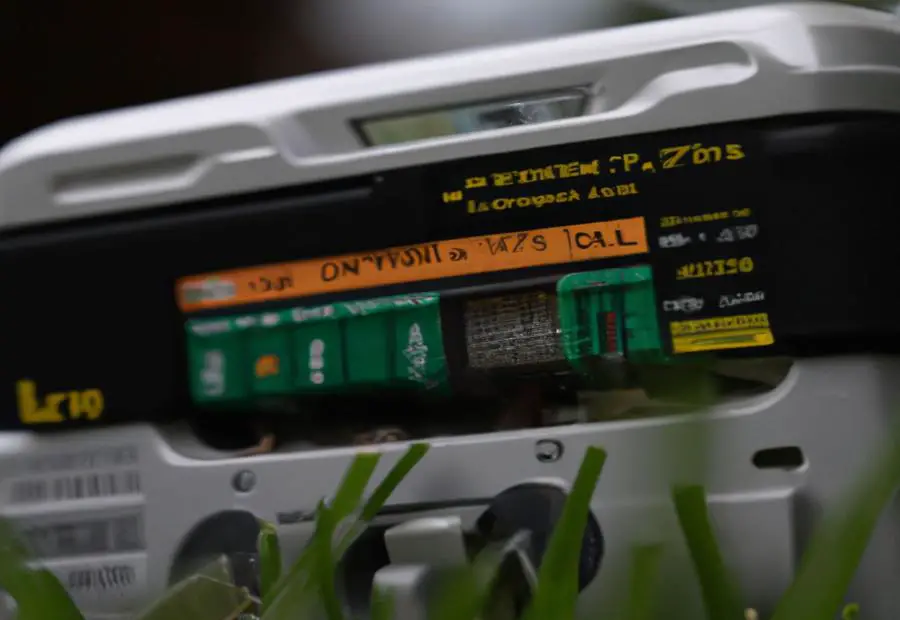
Photo Credits: Gardenerheaven.Com by Larry Young
Choosing the right lawn mower battery is crucial for optimal performance. In this section, we will explore the factors you need to consider when selecting a lawn mower battery. From understanding the power sources for different types of lawn mowers to comparing gas-powered and electric models, we’ll provide valuable insights to help you make an informed decision. Get ready to power up your lawn mower with the right battery for the job.
Different types of lawn mowers and their power sources
A lawn mower battery is vital. It provides power to start the engine and run the mower functions. It sparks the fuel and powers ignitions, lights and electric starters. Without it, the mower won’t start.
There are 3 types of mowers:
- Gas-powered. They use a combustion engine and gasoline. The battery supplies electrical energy to start the engine.
- Electric mowers. They use electricity and can be corded or cordless. The latter runs on a rechargeable battery.
- Hybrids. They combine both electric and gas-powered functions.
It’s important to get the right battery for your mower. Gas-powered mowers need a larger battery with more voltage. Electric mowers require less voltage.
The lawn mower battery: the unsung hero of grass massacre!
The purpose and function of a lawn mower battery
A lawn mower battery serves one purpose: to power the lawn mower. It stores and delivers electrical energy to the mower’s components, such as the ignition system, starter motor, and lights. This allows the mower to start and operate without any manual effort.
The battery is vital for the mower’s smooth functioning. Without a reliable battery, the mower would not be able to start or operate effectively. It provides electrical energy to the ignition system, igniting the fuel and starting the engine.
In addition, the battery powers lights and accessories. This increases visibility during operation, especially in low-light conditions or when mowing at dusk or dawn.
In summary, the lawn mower battery ensures the machine can start and operate efficiently. It’s essential for optimal performance and functionality of the mower.
Fun Fact: A well-maintained battery can last 3-5 years with regular use.
Comparison between gas-powered and electric lawn mowers
Gas-powered and electric lawn mowers can be compared. Gas-powered ones use gasoline as fuel, and electric mowers utilize batteries. Let’s look at the factors that set them apart.
- Power Source: Gas-powered requires refilling with gasoline. Electric mowers use rechargeable batteries. This affects convenience, cost, and environmental impact.
- Noise Level: Gas-powered are noisier than electric mowers. Electric models produce a lower decibel level, making them better for noise-sensitive places.
- Emissions: Gas-powered lawn mowers emit fumes due to burning gasoline. Electric mowers have zero emissions.
- Maintenance: Gas-powered needs oil changes, spark plug replacements, and air filter cleanings. Electric mowers need less maintenance since they don’t have many moving parts.
- Performance: Gas-powered lawn mowers can handle tough grass conditions and larger yards better. Electric mowers are suitable for average-sized lawns.
By considering these factors, homeowners can decide which type of lawn mower they need.
Choosing the Right Replacement Lawn Mower Battery
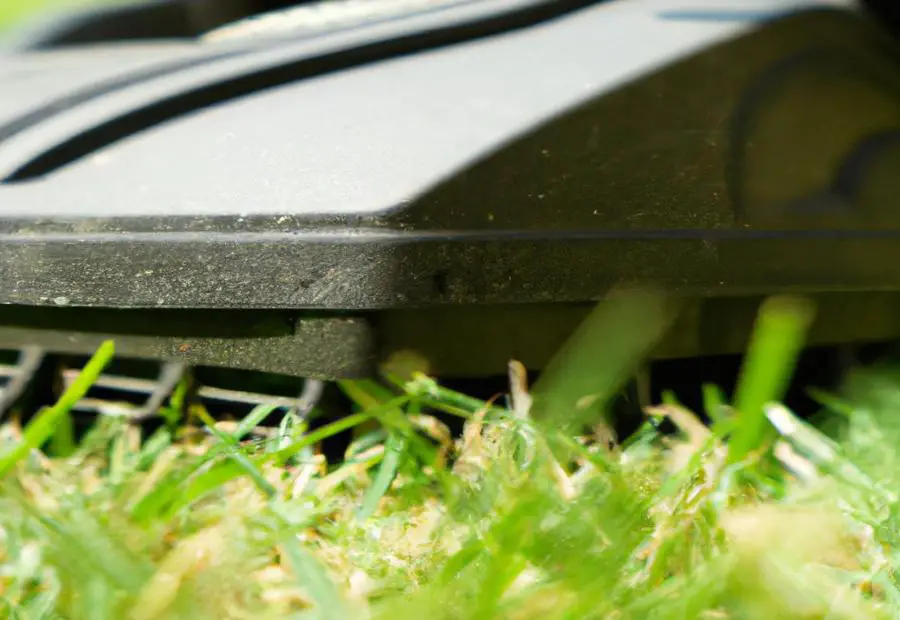
Photo Credits: Gardenerheaven.Com by Gerald Lee
When it comes to choosing the right replacement lawn mower battery, there are a few key factors to consider. In this section, we will explore important specifications, such as voltage and compatibility, that play a crucial role in selecting the perfect battery. We’ll also discuss how checking the mower’s manual and battery size chart can guide you in making the right choice. Additionally, we’ll touch upon proper maintenance techniques that can help extend the lifespan of your battery.
Important specifications to consider
Let us divide these key specifications into a table:
| Specification | Description |
|---|---|
| Type of Battery | Refers to the technology used |
| Size and Physical Parameters | Considers the mower’s fitment |
| Voltage and Capacity | Determines the power |
| CCA Rating | Measures starting ability |
To make sure your mower works optimally, take these specs into account. Consult the mower’s manual or a battery size chart to find a suitable replacement. Also, follow proper maintenance techniques to prolong your battery’s life.
Type of battery
Lawn mower batteries come in different types, to suit different power needs. The battery you choose will depend on the size and type of mower, voltage, and capacity needed.
- Gel Batteries: Maintenance-free, leak-proof, long lifespan. Resistant to vibration, can be mounted in any orientation.
- AGM Batteries: Maintenance-free, high-energy density, consistent power output.
- Lead-Acid Batteries: Commonly used, affordable, reliable. Need regular maintenance, check fluid levels, and add distilled water when needed.
Lithium-ion batteries are also available for some electric mowers. They are lightweight, fast-charging, and have longer runtime than lead-acid batteries.
When selecting a battery, consider the requirements of your mower, and the desired performance characteristics. Make sure the battery is compatible with the mower’s electrical system and provides enough power.
Understand the different types of batteries for lawn mowers, to make the best decision. Optimize performance and longevity, and ensure a smooth mowing experience.
Size and physical parameters
Let us look at the table which explains the normal sizes of lawn mower batteries:
| Group | Length | Width | Height |
|---|---|---|---|
| U1 | 8.3 inches | 5.1 inches | 7 inches |
| U1R | 8.3 inches | 6.6 inches | 6.9 inches |
| U1XHD | 9.4 inches | 5.3 inches | 10 inches |
| U1XHD-AGM | 7.68 inches | 5.12 inches | 6.61 inches |
| U1R-AGM | 7.75 inches | 6.46 inches | 7 inches |
Different makers may have small changes in their battery sizes. Remember these figures when you choose a replacement.
Physical things like weight, terminal position, and design must also be considered along with size.
For best performance and durability, other aspects should also be taken into account when picking a lawn mower battery.
Voltage requirements should be checked to make sure it is compatible with the machine’s electrical system.
It is worth mentioning that many people have chosen batteries that are too small or large for their mowers due to disregarding size and physical parameters. This highlights the importance of taking these into account to avoid damage caused by incompatible batteries.
Voltage and capacity
For a clearer grasp of the link between voltage and capacity, let’s take a closer look at them.
6-volt and 12-volt are two common choices for lawn mower batteries. The voltage determines how much power the battery gives off; higher voltages give more power. This is particularly essential for larger or more extensive lawn mowers that need more energy.
Capacity is the charge a battery can hold and provide in a particular period. It is usually measured in ampere-hours (Ah). A larger capacity means the battery can give out more energy before needing recharging. This is necessary for longer working sessions or when running a powerful mower.
When picking a replacement lawn mower battery, it’s essential to consider both voltage and capacity specs based on your mower needs. Higher voltages might be needed for bigger or more powerful mowers, while higher capacities guarantee extended operation without recharging.
CCA rating
What is the CCA rating? It’s a helpful way to measure the performance of your lawn mower battery. Check out a table with different CCA ratings and characteristics. This includes the CCA rating range, suggested application, and performance level. By using this table, you can find the right CCA rating for your mower model and conditions.
But there are other things to consider when picking a replacement battery. Types, size, voltage, and capacity are all important. Knowing all these factors will help you get the perfect battery.
One customer was in the same boat. They chose a low CCA-rating battery, but it had trouble starting in the cold. They asked experts and switched to a higher-rated battery. After that, their mower started much better in the cold. That’s why it’s important to pay attention to the CCA rating!
If you want to find a manual or battery size chart, don’t forget to ask Siri. She might know where to find them.
Checking the mower’s manual and battery size chart
Checking the mower’s manual and battery size chart is key when picking a replacement lawn mower battery. The manual delivers specific info about the type of battery needed for the mower, and the battery size chart aids in figuring out the right physical parameters for compatibility. Here’s a guide:
- Track down the mower’s manual: Refer to the owner’s manual provided with the lawn mower. It has important data on the battery specs, including voltage and capacity.
- Find the battery section: Look for a dedicated section in the manual that gives detailed instructions on selecting and replacing the lawn mower battery. This section could also include a diagram or table showing compatible battery sizes.
- Work out the required voltage: Check for info on the voltage rating needed for your specific lawn mower model. The manual will specify if it needs a 6-volt or 12-volt battery.
- Note down physical parameters: Make note of any physical parameters mentioned in the manual, like overall dimensions, terminal placement, and weight limits. This will aid in making sure you choose a replacement battery that fits properly within your mower’s assigned battery compartment.
- Consult the battery size chart: Many manuals have a size chart that lists compatible batteries based on their physical dimensions. Cross-reference your notes from step 4 with this chart to figure out fitting replacement options.
- Seek professional help if needed: If you are unsure or can’t find the necessary info in the manual or size chart, talk to a pro technician who can help you pick an appropriate replacement lawn mower battery.
It’s worth noting that while consulting your mower’s manual and referring to a battery size chart is an essential step in choosing a replacement lawn mower battery, it’s equally important to make sure regular maintenance of your existing battery to extend its lifespan. Following the right charging procedures, checking for corrosion, and storing the battery properly when not in use can help its longevity. By combining both proper selection and enough maintenance practices, you can make sure the lawn mower battery functions optimally throughout its service life.
Proper maintenance for extending the battery’s lifespan
For extending a lawn mower battery’s lifespan, proper maintenance is crucial. Follow these steps to guarantee your battery lasts longer and remains in ideal condition:
- Clean the battery terminals often with a mix of baking soda and water. This keeps a strong connection and avoids battery problems.
- Don’t overcharge – disconnect the charger after it’s fully charged.
- Store the battery correctly – cool and dry away from direct sunlight or extreme temperatures. Remove it from the mower during storage.
- Check regularly for any loose connections or damaged cables. This not only prolongs the battery life but also ensures proper functioning of other components.
Frequency of use, correct charging techniques, and appropriate storage conditions also affect the battery’s lifespan. Follow these guidelines and take care of your lawn mower battery to maximize its life and ensure reliable performance. A well-maintained battery offers greater efficiency and reliability when operating your equipment.
Conclusion
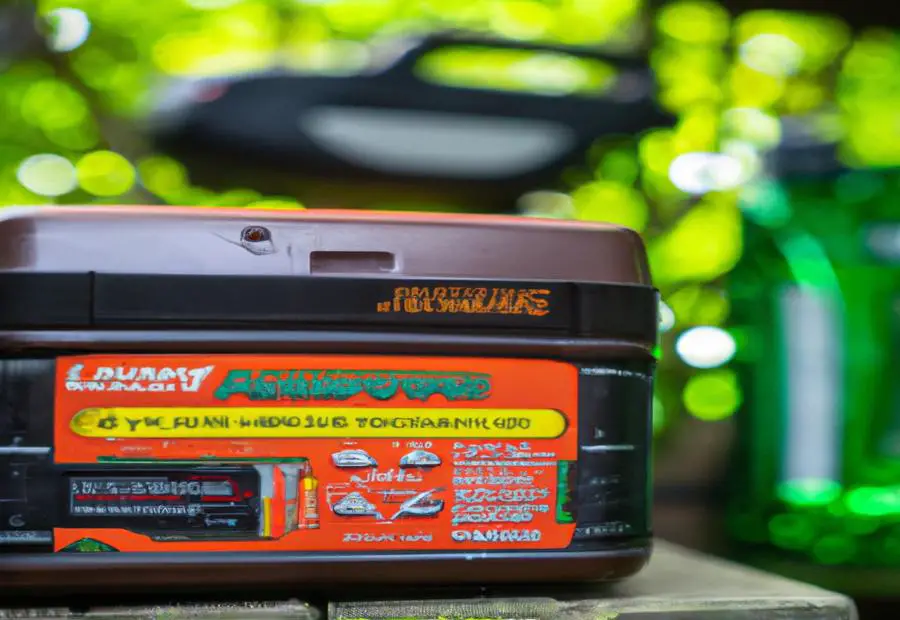
Photo Credits: Gardenerheaven.Com by Justin Brown
Lawn mower batteries come in different voltages. Typically, they range from 12 to 36 volts. This depends on the power requirements and the type of battery. Make sure to match the battery voltage with your mower’s requirements for optimum performance.
It is vital to consider the voltage rating of a battery. The higher the voltage, the more energy it can deliver to the motor. However, using a battery with a higher voltage than recommended can damage the mower or pose a safety risk.
Electric mowers usually use 12 to 24 volts, while commercial or industrial-grade mowers may need higher voltage batteries of 36 volts. Check the manufacturer’s specs or manual for your model.
To ensure longevity and performance, inspect the battery for any damage or wear. Also, charge it using the manufacturer’s recommended charger. Lastly, store the battery in a cool and dry place.
Remember to always refer to the manufacturer’s guidelines or consult a professional if you have doubts or concerns about the voltage requirements. In the end, understanding and adhering to the right voltage is key for safe and efficient operation.
Some Facts About How Many Volts Is a Lawn Mower Battery? Exploring Battery Voltage and Compatibility:
- ✅ Lawn mowers with electric starters require a battery to operate. (Source: Team Research)
- ✅ The electrical system of the lawn mower determines whether it requires a 6 or 12-volt battery. (Source: Team Research)
- ✅ A 6-volt lawn mower battery has three battery cells wired in series, providing 6.3 volts of DC electrical energy. (Source: Team Research)
- ✅ A 12-volt lawn mower battery has six battery cells wired in series, providing 12.6 volts of DC electrical energy. (Source: Team Research)
- ✅ 12-volt batteries are more commonly used in electric-start lawn mowers compared to 6-volt batteries. (Source: Team Research)
FAQs about How Many Volts Is A Lawn Mower Battery? Exploring Battery Voltage And Compatibility
How many volts is a lawn mower battery?
A lawn mower battery can be either 6 volts or 12 volts, depending on the electrical system of the lawn mower.
What are individual battery cells in a lawn mower battery?
Individual battery cells in a lawn mower battery are components that consist of a positive electrode made of lead oxide and a negative electrode made of lead. These cells are immersed in an acidic electrolyte solution and are responsible for producing electrical power.
What types of batteries are used in ride-on mowers and lawn tractors?
Ride-on mowers and lawn tractors typically use lead-acid batteries, which are small and have CCA ratings in the range of 100A to 300A. These batteries are similar to car starter batteries but smaller in size.
Can I use a gel-type battery for my lawn mower?
Yes, gel-type batteries can be used in lawn mowers. These batteries offer better vibration resistance and are maintenance-free, but they may have different specifications in terms of physical dimensions and compatibility. It is important to check the mower’s manual or consult a specialist to ensure compatibility.
What happens if the lawn mower battery fails to start the mower?
If the lawn mower battery fails to start the mower, it may indicate a problem with the ignition process or a dead battery. It is recommended to check the battery’s charge level, connections, and overall condition. If needed, the battery may need to be recharged or replaced with a new one.
What are the main differences between lawn mower batteries and car batteries?
The main differences between lawn mower batteries and car batteries are their size and starting current. Car batteries are larger and provide higher starting currents, while lawn mower batteries are smaller and typically have CCA ratings in the range of 100A to 300A. Additionally, lawn mower batteries are specifically designed for lawn mowers and may have different physical dimensions and terminal positions.




